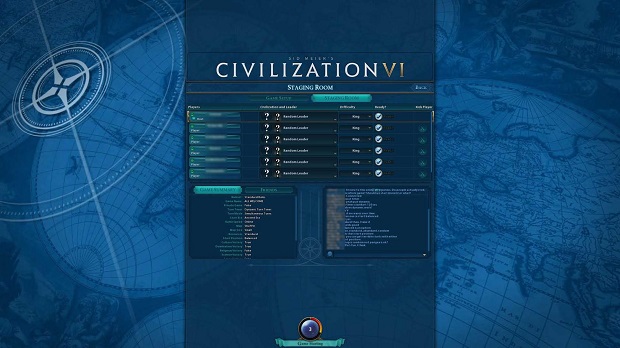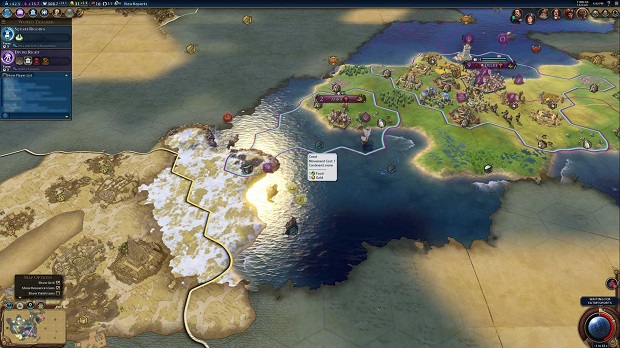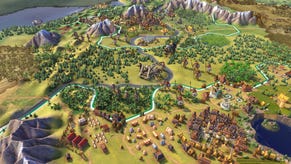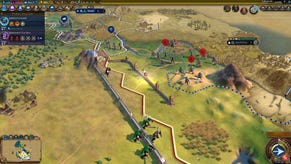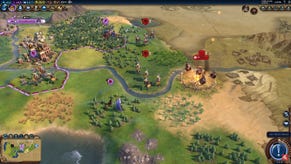Civ 6 multiplayer: new challenges in strong scenarios
United Nations?
Civilization 6 [official site] is a wonder in singleplayer, though we do have some complaints: the AI still struggles at times and diplomacy isn't quite the revolution we'd hoped for. The perfect way to sidestep would be to play with nonartificial intelligences, who can conduct diplomacy using swear words and cruel deceptions. We sent our cultural ambassador Robert Zak onto the internet to test out Civ 6 multiplayer in all its forms. Here is his report.
I used to play Civilization exclusively by myself. The fantasy of empire-building was one that I enjoyed doing in my own time and on my own terms, getting swept up in whatever alternative world history the game's systems - combined with my hunger for global domination - would generate. In the original Civ, I'd while away the minutes admiring my ramshackle palace with its medieval castle wings ostentatiously flanking an Arabic dome; in Civs 1 through 3, I loved looking at my cities from above using the dedicated aerial views; in Civ 4, I'd zoom all the way out of the world view until I was in space, appreciating the smallness of the planet relative to the cosmos, before plummeting back in through the swirling clouds all the way in on my civilization, panning across it at full zoom while listening to the ambient sounds that changed depending on whether I was hovering over cities, jungles, deserts, what have you.
You can't do any of that wonderful stuff with a turn timer, a beeper that reminds you that everyone is waiting for you to end your turn, and that one div who can't resist saying "faster pls" - even though in the previous turn I had enough time to tweeze an old fingernail out from the depths of my keyboard while patiently waiting for him to finish. These are some of the traits of the Civ multiplayer experience, and it's wonderful.
My expanded knowledge of Civ's mechanics over the years and the painful inability of the Civ V AI to cope with the new hex-based layout drew me towards the multiplayer. The workings of the game, its routes to victory and weird idiosyncrasies became too transparent in single-player. Not content with the difficulty level being based on how much of a head-start the eternally asinine AI had on me, I wanted my opponents starting on equal footing to me. I also wanted them to be just as sneaky and tactical as me, and equally capable of exploiting Civ's systems, rather than just waiting to be exploited themselves.
And so it was that Civ V became a weekly multiplayer routine, to be enjoyed with a small circle of friends at pre-arranged times every week. It was notoriously buggy, broken, and with AI that couldn't even approach you for a deal, let alone beat you in a war, but these flaws were drowned out by the joy of playing and dealing with real people, and the new gameplay elements that organically arose out of it. The high-interest loans, the proxy wars where you secretly provided troops to your weaker pals to take on bigger threats, the negotiations to trade back the Great Prophet you took hostage. It added a layer of distinctly human complexity.
Notwithstanding, Firaxis had a lot of fixing to do for the Civilization 6 multiplayer. I headed out to see if the old online bugbears of Civ V had been fixed, how the new multiplayer scenarios - made to be completed in a couple of hours - played out, and whether it's possible to functionally play Civ in the company of strangers.
I started off by trying some standard-rules matches. There wouldn't usually be more than ten pre-match lobbies to join at any one time, and of these at least half must've been private games where they forgot to tick the 'Private Game' box, because I got kicked from them the second I joined. To hell with these damn Civ cliques, I thought. I created my own game, giving it the unequivocal label, ALL WELCOME. It filled up in under a minute, making me wonder whether at any one time there were actually thousands of dejected Civvers out there - broken after being kicked from countless pre-game lobbies, but holding out hope that one day a benevolent somebody (like me) would create a game that didn't turn them away.
If I could create a Civ game to accommodate all these players, I would (maybe I should start a Patreon to fund the necessary gargantuan bandwidth?) but for now I was happy that I saved at least five of these wandering souls…
I set the game to the new 'Online' speed, which squeezes the 6,000-year gamespan into a manageable 250 turns (in Civ V, the fastest game speed was 330 turns), and the turn timer to 'Dynamic' (a mistake in hindsight as it massively overscales the timer relative to the era you're in - by the medieval era, turn times had bloated to a molassal 3.5 minutes, which people abused to take extended food or toilet breaks that I'm convinced they would've otherwise resisted).
Firaxis have done a great job of the multiplayer on a technical level. Throughout the 12+ hours I played, there were only a couple of instances where players had to resync, and these lasted on more than several seconds and didn't kick the rest of the players out to the loading screen as with Civ V. While it's hard to say whether the many times other players disconnected - never to return - was a technical or human issue, the fact that most instances occurred after the players in question were either attacked by other players, had their cities converted to another religion, or - most petulantly of all - had their own attack on another Civ repelled, makes me sceptical that Firaxis are to blame. I did have one major crash where everyone disconnected, which was a bit of a problem as there wasn't an option to auto-rejoin the game and I wasn't friends with any of my fellow players, essentially killing the game.
I experienced little lag as game host, and only small delays when the game was processing AI turns. While my cabled 150 MBps broadband connection is partly to thank for that, no internet speeds could overcome the technical horrorshow of Civ V when it started playing up, so it seems that Firaxis have well and truly put their demons behind them.
But back to the turn-to-turn reality of the game. Things started off smoothly - minimal conversation except for the occasional exclamation of disbelief that no one's met another civilisation with the first 40 turns or so made for an appropriately civilised start. The map was made up of several large islands, and I think that each player had one of their own. Once I picked up some seafaring techs, I quickly learned that Russia was on the island west of me, and took the liberty of extending the cultural borders of my westernmost city over the water onto a single-tile peninsula on their island (which happened to contain a precious iron deposit, making me suspect that the ostensibly procedural map generation might actually be a sentient AI that deviously places resources in positions that are bound to lead to conflict).
My acquisition of The Iron Peninsula was soon spotted by the scouting ships of a couple of other players, both of whom complimented my tilegrab publicly, no doubt to bring it to the attention of my Russian neighbour and foment distrust between us. Clearly it worked, because soon I got word from one of the scheming scummers, Spain, that there were was a military amassing in Russia. It was clever puppeteering on Spain's part. I imagine the player wasn't doing it to help me as such, but to ensure that Russia didn't steamroll me, taking my cities and wonders, and thereby shifting the global balance of power. For Spain, the best thing was for Russia and myself to get embroiled in a drawn-out war that funnelled our resources into military, instead of culture or science. It's this kind of Machiavellianism that I love about Civ multiplayer, even if I'm on the receiving end of it.
As Spain warned, Russian troops soon began to move over the sea, so I made sure to strike first (no warmonger penalties among real people), setting my caravels upon his sea-stranded spearmen and galleys. This also gave me a wonderful excuse to kill his apostles, as well as to send mine on a secret, roundabout route to Moscow. I swiftly sunk Russia's half-baked plans in the channel waters, though they had occupied the pesky iron mine over which this whole kerfuffle had started.
But just as things were starting to get interesting, they began falling apart. In another part of the world, Egypt declared war on Greece, to which the Greek leader indignantly asked "Why?". "Land" was the simple, cold answer. Now in the real world, if you use "Land" as a casus belli, people might expect you to shout "Lebensraum!" as you goose-step all the way to the territory you want, but in Civ multiplayer, expansionist logic is sound logic. Perhaps the person asking 'Why?', our Pericles, was too much of an optimist, believing we'd all progress together towards a cultural or science win, then together celebrate what a wonderful, aspirational game Civ is. I'll never know, because Pericles dropped out moments after being attacked.
I hoped that this quitter was a one-off - a naive soul who couldn't accept that in an online Civ game everyone's assuming will last just the one session, people will be moving fast, and war, whether religious or military, will take priority over more passive victory paths. But soon after that, the next player fell. After I fended off Russia's failed ambush, courtesy of the assistance from my 'friend' in Spain, I blitzed Moscow with apostles, vanquishing their religion. In response, they spawned a squad of apostles, presumably not realising that they would now be preaching the good word of my Indian Catholicism, not Russian Zoroastrianism. That was the final straw for religiously-indoctrinated Russia, and within the next half hour another two players dropped out, just about reverting the multiplayer game to a single-player one.
While I never quite believed that a full match with strangers would reach a satisfying conclusion, I'd hoped that Civ players would be a bit more, well, civilised. It was a similar experience in the other couple of 'Standard Rules' games I tried. While no insults were thrown outside of good-natured fighting talk, people showed a frustrating tendency to quit at the first sign of adversity. I guess there's little need for sportsmanship and self-discipline when you can just disappear without having to sheepishly re-enter the room half an hour later and apologise to everyone for throwing a strop.
On the other hand, it was interesting to see the level of acceptance among the more composed players that online games with strangers are pretty much doomed to fail. People were genuinely surprised that we'd reach turn 60, 70, 100 without anyone dropping out, though those same people would be gone by turn 120. Even I reached a point in my third game where I no longer felt guilty about dropping out - simply because I don't have eleven non-stop hours to commit to a single Civ session.
At the very least, these ill-fated online sessions felt like good practice for when I'd have proper, organised sessions with my friends. On the other hand, maybe there's something to be said about the fact that people are willing to play the first 100-120 turns of an online Civ game over and over again - knowing full well they won't see the game through; could it be that those intrepid, exciting early turns are just much better than what comes later, and that many people just don't find the increasing amount of time spent waiting for other people worth it?
That's where the scenarios come in. Clearly added to address the issues of slog and shitty sportsmanship, they offer bite-sized experiences with unique victory conditions that can be compared to the Missions variant of Risk (y'know, the faster version where your dad might actually be able to sit through the whole game during a family session at Christmas instead of slipping into an eggnog-assisted snooze). Oddly, I couldn't find a single existing lobby for any of the scenarios, so again I had to take matters into my own hands.
There are three multiplayer scenarios in the base game (made using the same tools that will eventually be available to the community) - Ancient Rivals, Global Thermonuclear War and Hallowed Ground. Failing to attract a lobby's worth of players to Thermonuclear War, I tried Ancient Rivals, again with the lobby name, 'ALL WELCOME,' again attracting a full house. In 50 turns, the civ that meets the most of several victory conditions - builds the most wonders, explores the most hexes, pillages the most tiles, researches the most civics - is the winner. I set a stable 120-second turn timer this time, meaning that the game would last an absolute maximum of 1 hour and 40 minutes. Doable.
The first game went swimmingly, with only one person of the six dropping out. I coasted to victory thanks to an aggressive deforestation policy that fuelled production of wonders and cultural districts. Even in those 50 short turns, new little strategies crop up - like hunting down enemy scouts so they can't chase that 'most hexes' victory condition, or having a warrior loitering around enemy cities, ready to pillage their tiles the moment they're built. It's uncharacteristically twitchy for Civ, but it works very well. My second match of Ancient Rivals was sadly marred by dropouts, with the initially six-player game ending with just three of us.
In contrast, Global Thermonuclear War was chaotic. It's set in the Atomic era with the aim being to either invade the most City-States, build the most tanks or - if one person drops an atomic bomb on anyone else - nuke the most cities. You'll need a big turn time limit on this one - if only because the first turn takes a good several minutes as you set up your government, policies, and a substantial starting force.
It plays out like a kind of inverse Cold War - you can go for the two non-nuclear options, but your awareness that one of the other players will inevitably press the red button means that you're preparing for the worst - building nukes and setting them up to be in range of enemy cities, knowing full well that the nuclear deterrent here is actually a nuclear incentive.
Unfortunately, I never managed to attract enough players to the religion-focused scenario, Hallowed Ground, but my sentiment would remain the same; these scenarios are showcasing the new ways you can play Civ multiplayer. Once players adapt to the idea that you can have a satisfying game in 50 turns, and once the community starts creating Steam Workshop-integrated multiplayer mods, then the online aspect might finally become as crucial to the game as the single-player. The scenarios enable it to take the form of an evening boardgame (you could even complete a game in Hot Seat), instead of an 18+ hour commitment.
As well as being a more satisfying and in some ways 'truer' form of Civ than the single-player (thanks largely to the replacement of silly AI with people), multiplayer also highlights one of the most longstanding problems with the series. Tactically and immersively, those first 100 turns continue to define the game; unless you're playing with friends, that initial rush inevitably makes way for the slowdown of the mid-game, exacerbated by having to wait longer and longer for your fellow players to end their turns. In its current state, a standard multiplayer game of Civ 6 with strangers remains unfinishable without some serious dedication and organisation.
But with expansions no doubt forthcoming, as well as tools for the community to build their own modes, Firaxis will continue to address these long-term niggles. What's crucial at this point is that it works smoothly, and has laid the groundwork for both the devs and the community to make the online aspect less intimidating and more intriguing for that majority of people who still see Civ as a dish best served solo - just as I once did.
Civilization VI is out now for Windows and is available through several digital retailers for £50/$60/€60.




